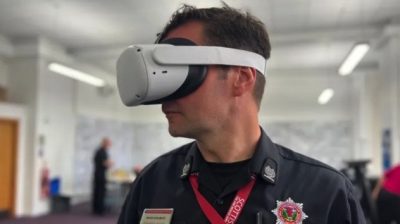University of Dundee specialists have developed a new virtual reality (VR) training tool to give fire investigators a way to practice in a simulated environment.
Working in collaboration with Danish Police fire investigators, researchers at the University’s Leverhulme Research Centre for Forensic Science (LRCFS) and Duncan of Jordanstone College of Art and Design (DJCAD) have created a virtual fire scene environment using digital images taken in the aftermath of real fires.
Training for police and fire service investigators often requires controlled burning of simulated fire scenes. These are set up in shipping containers or in abandoned properties, allowing investigators to explore the scene and reach conclusions about where the fire started and what caused the fire.
While these tests are efficient, and provide a physical space to conduct investigations, but test fires are costly, unsustainable, and environmentally unfriendly.
Capturing the aftermath of a controlled burn using digital imaging and VR technology allows one site to be used in multiple training sessions while providing a realistic setting for investigators to explore and examine the scene in a safe environment.
Professor Niamh Nic Daeid, Director of LRCFS, said, “We have been looking at how VR can facilitate fire scene investigation and the investigation of crime scenes for some time now.
“What is most important is that we ensure that we use virtual reality in a way that is underpinned by a robust scientific approach which will stand up to the scrutiny of our legal systems and our Courts and we are pioneering this approach now in Scotland.”
The Leverhulme team are collaborating with fire investigators from the Scottish Police Authority (SPA) Forensic Services and Scottish Fire and Rescue Service (SFRS) fire investigators to explore operational opportunities using VR in fire investigation within Scotland. Investigators from both sides visited the University this week to try it out for the first time.
Karen Robertson, SPA Forensic Services, said, “This has been a fantastic collaborative opportunity for the Fire Investigators from Forensic Services and our colleagues in the Fire Service. The Fire Investigators have been using VR to investigate the same fire scene which has known origin and cause. The data from this will be used to improve the crime scene-to-court provision of forensic fire investigation for the people of Scotland.”
To create the technology, specialists worked with Danish Police fire investigators to capture and develop the realistic VR scenes using abandoned buildings in southern Denmark. These were staged and burned, and hundreds of images were taken following the methods developed in Dundee to document the site in the aftermath of the fire.
The developed programme has already been implemented in fire investigation training in Denmark.
Eva Ljungkvist, Special Crime Unit, Danish Police, said, “The feedback from the sessions has been fantastic. Investigators have been using the tool effectively while applying scientific methods to conduct their investigation. This is exactly what we want to see.
“This partnership is a great success, and we are looking forward to continuing this joint venture with the organisations involved.”
In September, the National Robotarium, alongside Scottish Fire and Rescue Service, announced development of on an AI-powered smart helmet that helps firefighters better locate victims.
The smart helmet could help firefighters quickly map their surroundings and allow fire and rescue crews to navigate hazardous environments more easily and efficiently locate fire-scene victims.
Source: DIGIT

